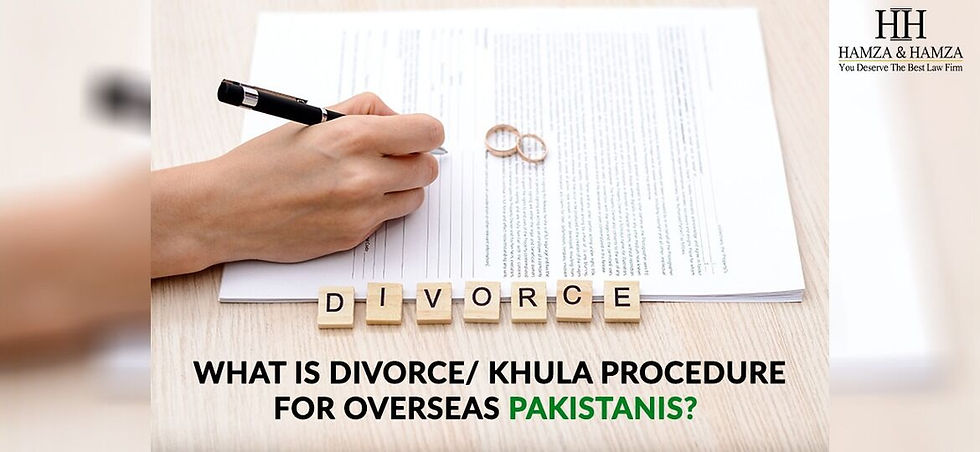Is the Khula Procedure in Pakistan Fair and Accessible for Women?
- Hamza and Hamza
- Jul 24, 2025
- 3 min read
The concept of Khula Procedure In Pakistan offers Muslim women a legal pathway to seek dissolution of marriage when reconciliation becomes impossible. Unlike Talaq, which is initiated by the husband, Khula empowers the wife to approach the court and request the termination of her marriage. While this legal provision reflects progressive thinking within the framework of Islamic and Pakistani family law, questions remain about its fairness, accessibility, and practicality for the average woman in the country.
Understanding Khula: What the Law Says
Under the Family Courts Act 1964 and the principles of Islamic jurisprudence, a woman may apply for Khula by stating that she can no longer live with her husband within the limits prescribed by Allah. The process formally begins by filing a suit in the Family Court of the district where the woman resides or where the marriage was registered. The wife must submit a written plaint, which includes details of the marriage and the reasons for seeking Khula.
The Family Court typically issues notices to both parties and attempts reconciliation through the Union Council or a reconciliation committee. If reconciliation fails, the court may grant a decree of Khula, often requiring the wife to return the Haq Mehr (dower) and any other benefits she received from the husband, depending on the circumstances.
Step-by-Step Khula Procedure in Pakistan
Hiring Legal Counsel: A woman seeking Khula is advised to hire a family law expert to help draft and submit the plaint.
Filing the Suit: The suit is filed in the relevant Family Court along with a copy of the Nikahnama (marriage certificate) and the woman's national identity card.
Notice to Husband: The court issues a notice to the husband for a response and schedules a hearing.
Reconciliation Attempts: The court usually attempts reconciliation through multiple hearings.
Court Decision: If reconciliation fails, the court issues a decree of Khula.
Union Council Certificate: The woman must also obtain a Nikkah Dissolution Certificate from the Union Council.
Is It Truly Accessible?
While the procedure is well-defined, many women face significant barriers. Social stigma, lack of legal awareness, economic dependency, and fear of retaliation often prevent women from initiating or pursuing the Khula Procedure In Pakistan. Additionally, delays in the court system and procedural hurdles—such as summoning an uncooperative husband—can cause distress and prolong the ordeal.
The requirement of returning Haq Mehr can also be financially burdensome. Even though courts may waive this in extreme circumstances (such as abuse or abandonment), the practice often discourages economically vulnerable women from pursuing Khula.
Legal Reforms and Evolving Interpretations
Recent court rulings and legal interpretations in Pakistan have made the Khula process somewhat more responsive to women’s rights. Courts have acknowledged emotional and psychological abuse as valid grounds for Khula, broadening the traditionally narrow view focused solely on physical harm or neglect. Moreover, the Family Courts’ expedited procedures and efforts at gender sensitivity are promising, although implementation remains uneven.
Role of Legal Experts
Given the emotional and legal complexity involved in a Khula case, professional legal support is essential. Reputed law firms like Hamza & Hamza Law Associates play a vital role in representing women effectively. Their team of experienced family law attorneys not only ensures the client's rights are protected but also simplifies the legal process by offering transparent guidance, efficient litigation, and timely communication. Their focus on client confidentiality and dignity has made them a reliable choice for women seeking justice through Khula.
Conclusion
While the Khula procedure in Pakistan is a critical legal avenue for women trapped in unhappy or harmful marriages, its practical accessibility is still marred by societal, financial, and procedural challenges. For it to serve its true purpose, broader awareness, legal reforms, and reliable legal representation are essential. Hamza & Hamza Law Associates continue to support this cause by offering professional, compassionate, and effective legal services to women navigating this difficult journey.








Comments